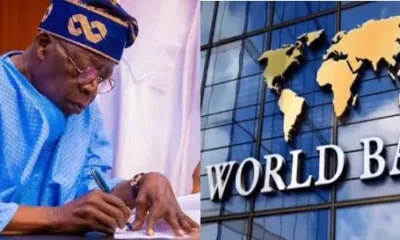The World Bank has disclosed that Nigeria’s debt, which may be considered sustainable for now, is vulnerable and costly.
According to the Washington-based global financial institution, the country’s debt is also at risk of becoming unsustainable in the event of macro-fiscal shocks.
The bank said this in the November edition of its Nigeria Development Update.
It said, “Nigeria’s debt remains sustainable, albeit vulnerable and costly, especially due to large and growing financing from the Central Bank of Nigeria.
“While currently the debt stock of 27 per cent of the Gross Domestic Product is considered sustainable, any macro-fiscal shock can push debt to unsustainable levels.
“However, the debt to the GDP in Nigeria is rising quickly, and the total stock of debt in absolute value has almost doubled between 2016 and 2020, and without a policy change is expected to reach 40 per cent of the GDP by 2025.”
READ ALSO: Debt: Despite Criticism, Reps Approve $5.8 Billion Loan For Buhari
The bank further expressed concerns over the nation’s cost of debt servicing, which according to it, disrupts public investments and critical service delivery spending.
“The cost of debt servicing is also a concern as it is potentially crowding out public investment and critical service delivery spending. Interest costs have been above two per cent of the GDP since 2018, reaching 2.4 per cent of the GDP in 2019 and then falling to 2.2 per cent of the GDP in 2020.
“Cost of debt is high as Federal Government also resorts to overdraft (Ways and Means financing) from the CBN to meet in-year cash shortfalls. At end of 2020, the stock of the CBN Ways and Means financing was estimated at N13.1tn or 8.5 per cent of the GDP,” it stated.
It, however, said that the Federal Government was making efforts to negotiate terms with the CBN in order to convert the stock of overdraft financing into a long-term debt instrument, which would lower the cost of debt for the government and enhance fiscal sustainability over the medium long term.
Economists have raised concerns over the rising debt profile of the Federal Government.
The PUNCH had exclusively reported that the Federal Government was planning to push its public debt stock to N50.22tn by 2023, with domestic debt at N28.75tn and external debt at N21.47tn.
This was according to the projections in the National Development Plan 2021-2025.
The Debt Management Office had disclosed that Nigeria’s public debt was N38tn as of the end of the third quarter of 2021, with the total debt stock rising by N2.540tn in three months between July and September 2021.
The NDP shows that the regime of the President, Major General Muhammadu Buhari (retd.), plans to accumulate about N12tn debt in two years from 2021 to 2023.
However, based on the plan, the government targets a reduction in total public debt by 2025.
A tabular illustration in the document shows the government targets N39.59tn debt stock for 2021, N46.63tn for 2022, N50.22tn for 2023, N50.53tn for 2024, and N45.96tn by 2025.
Analysts have agreed with the World Bank on the costly and vulnerable nature of Nigeria’s public debt.
The Fiscal Policy Partner and Africa Tax Leader of PwC, Mr Taiwo Oyedele, expressed his agreement with the World Bank’s assertion, highlighting the high cost of debt servicing.
He said, “I agree with the World Bank. Although the debt to GDP ratio is not too high, if you think about the debt service cost to revenue ratio, it is already over 70 per cent. That’s when you know it’s costly.
“Nigeria borrows at double-digit, and even when we borrow in dollars, the rates are very high and then you devalue the naira and the cost of servicing the debt in naira goes up because it is dollar-dominated debt.
“Put all of that together, and you can easily say to yourself that even though our debt to GDP ratio is very low, our cost of borrowing is unsustainable because it is very high, and therefore, make it very costly.”
He advised the government to have an integrated debt-revenue-expenditure strategy, which would address expenditure efficiency, terms of borrowing, and revenue optimisation.
He also advised the government to reconsider its priorities regarding its national budget.
A former Deputy Governor of the Central Bank of Nigeria and former presidential candidate, Kingsley Moghalu, also criticised the increasing borrowing tendency of the government, urging the officials to re-consider other ways of generating revenue for the country.
“There are many ways through which we can improve Nigeria’s domestic revenue situation without selling the future of our country. As to the argument that Nigeria does not have a debt problem but a revenue problem, that is mere sophistry. If you’re spending 90kobo of every one naira you earn repaying debt, you are insolvent.
“You cannot say that we have a debt-to-GDP ratio that allows you to continue borrowing. No! That is an argument for sustainable economies. You cannot be comparing Nigeria with advanced economies. We are in an economy that is still very basic.
READ ALSO: Nigeria’s Eurobonds Debts Rise By $9.37bn In Five Years
“If you are not earning enough revenue, why are you borrowing? You are just compounding your problem. Why don’t you focus on where to get the revenue from instead of lazily ignoring that problem and just trying to survive with borrowing?
“If an individual was living a life that way, it would be a calamity. That is why Nigeria is in a calamitous situation today economically,” he said.
According to Moghalu, it is also not reasonable to borrow for infrastructural development as the government can expand the public-private partnership options for such development.
He said, “You cannot be borrowing for infrastructure. They should go and expand the PPP options for infrastructure.
“You don’t have to impoverish this country by borrowing. This is not sensible economic management.
“How sustainable economically are those infrastructures they claim to be building? Are they yielding enough money to pay back the debt?”
(PUNCH)
